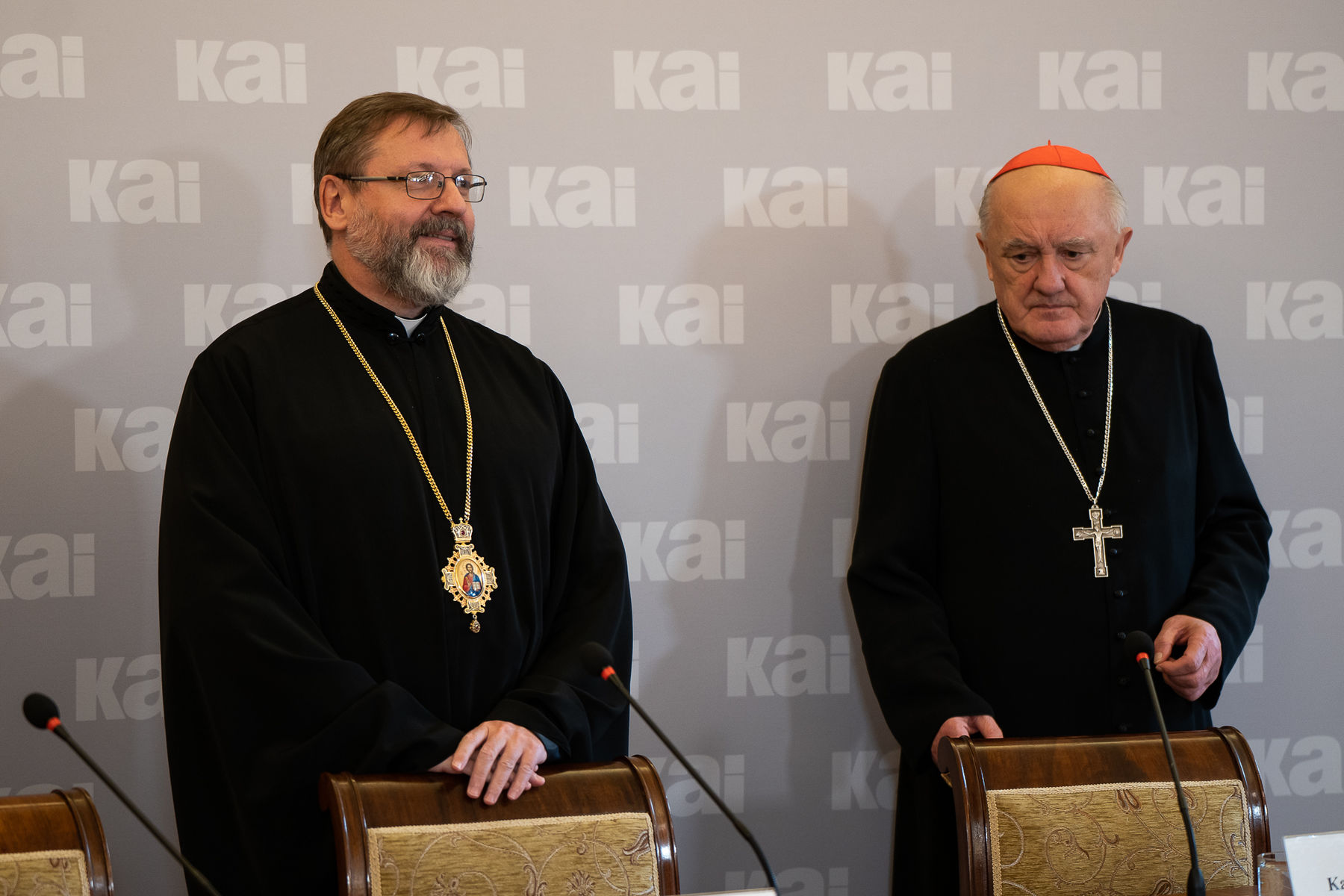
On November 15, the House of Warsaw Archbishops in Warsaw hosted a press conference “Let us not forget Ukraine” with the participation of His Beatitude Sviatoslav, Father and Head of the UGCC, Cardinal Kazimierz Nycz, Archbishop and Metropolitan of Warsaw, and Catholic Information Agency (KAI) journalist Krzysztof Tomasik, co-author of the book of testimony with His Beatitude Sviatoslav “God has not forsaken Ukraine” about the current war, which was published in February this year.
The Head of the UGCC visited Warsaw as part of his visit to the European capitals of Rome, the Vatican, and Brussels.
One of the core issues that His Beatitude Sviatoslav urged and discussed during the meetings on this European tour was Russia’s full-scale war against Ukraine, which has been raging on for almost two years.
A war that shook and destroyed the foundations of international law established after World War II. A war has arisen, putting to the test the existential question of Europe’s and the world’s security.
His Beatitude Sviatoslav believes that today, Europe and the world are facing great security and existential challenges, which have been posed by the war in Ukraine and which require accountable and mature responses.
The Head of the UGCC compared these challenges to those that Europe faced in the interwar period, before World War II, and to which Europe and the world could not respond adequately at that time but instead made concessions to the “right of force.”
“I am truly very concerned not only about what is happening in the
European Union today but also about the state of international
relations. The Head of the UGCC remarked, ‘Why is Russia succeeding—or
will succeed—in exporting war to the world? I have come to the
conclusion that today we are witnessing the weakness, or even the
failure, of international law as a whole.’”
His Beatitude Sviatoslav said he had a very substantive meeting with Ms. Federica Mogherini, Minister of Foreign Affairs of Italy (2014) and High Representative of the European Union for Foreign Affairs and Security Policy (2014–2019).
“We discussed that today, the conditions of sovereignty of states as a whole, of any state, are in question. More is said about the rights of global powers than about the sovereignty and independence of states in general, including small ones. This means that we are witnessing a regression of the trend of international law development from the times that existed in Europe even before the Second World War — which means that the bigger and stronger have more rights. And we remember what happened in Europe at that time: the sovereignty of Poland and Austria was questioned. And the people who had been under the protection of the law of these states lost their rights, their right to exist! And the first victim of that mutation of international law was the Jewish people.”
The Head of the UGCC pointed out the prerequisites for the current situation, namely, the creation of favorable conditions for Russian aggression and the basis on which this became possible—the undermining and destruction of the foundations of international law, unfolding before our eyes.
“The same thing that happened before the Second World War in Europe is occurring today on a global scale. If we fail to recognize and acknowledge the power of law, the power of force will prevail. St. John Paul II once emphasized this,” said His Beatitude Sviatoslav.
“That is why today’s ‘peace diplomacy’, all kinds of treatises or ‘peace agreements’ have no foundation. Because the foundation for making peace is international law,” he continued. “We are facing global trends of great concern. And here, the European Union, which always declares that the law is equal for all, has much to do to make democracy real — both at home, in the EU, and with problems at the global level. Because, indeed, everyone is now confused: how did it happen that a member of the UN Security Council (Russia — Ed.) attacked its neighbor? It means that this member of the UN Security Council was waiting for the moment when he could do it with impunity, and no one would do him any harm!”
Ukraine, His Beatitude Sviatoslav emphasized, has another experience: next year will be the 30th anniversary of the pact when Ukraine renounced nuclear weapons. “Do you remember the Budapest Memorandum? That is, Ukraine gave up these weapons because it believed in the power of international law that it would protect us. And what happened? The one who guaranteed that right attacked our sovereignty. Who in the world will trust international law now? For us in Ukraine, it was indeed an unheard-of blasphemy when Patriarch Kirill (head of the Russian Orthodox Church — Ed.) said that nuclear weapons are a guarantee of Russia’s independence and were created with the blessing and under the patronage of St. Seraphim of Sarov. His words and position affect everyone at all levels — politicians, heads of state, Christians, and ordinary citizens worldwide. Perhaps Russia has bided its time for many years, waiting for a moment when the fortitude of international law wanes, enabling it to carry out its actions against us—the people of Ukraine and our state—right now.”
